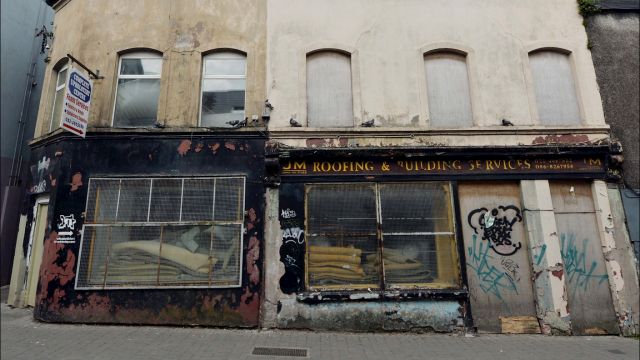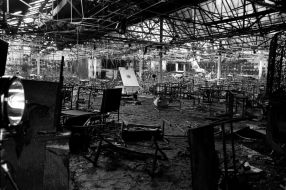Amid the influx of refugees coming into Ireland, the lack of housing has once again come to the forefront of conversation.
More than 23,000 Ukrainian refugees have come into the country already, as the Government struggles to find suitable accommodation to host them.
While the Government has scrambled to source housing, Minister for Housing Darragh O’Brien was advised by the construction industry to pay for the refurbishment of privately-owned vacant homes in order to meet the urgent housing need.
James Benson, director of the Irish Home Builders Association, said that labour shortages are affecting construction, and refurbishing existing vacant stock would be less labour intensive than some home-building projects.
According to the Residential Buildings Report, there were 90,158 vacant dwellings across the State in 2021.
As well as housing refugees, turning to the vacant dwellings that already exist rather than depending on new supply could be used to address the ongoing housing crisis.
Derelict Ireland
Although they may need more work to turn into suitable housing, derelict buildings are in no short supply throughout the State, something which Frank O'Connor and Jude Sherry have highlighted since returning from Amsterdam in 2018.
Mr O'Connor and Ms Sherry, whose background is in sustainable system design, run anois.org. They believe solving dereliction is key to addressing the housing crisis.
"When we came back to Cork... we realised that so many people didn't have a home and yet there was so much vacancy and dereliction," Mr O'Connor said.
"When we started a Twitter thread back in June 2020, it was very much about trying to understand and challenge why it had become normalised, from there then we shined a light on the levels of dereliction, not just in Cork but across the country.
so many #homeless, so many empty property in #Corkcity this home has a lot of character & potential #socialcrime #homeless @CorkHealthyCity @corkcitycouncil #pfg #programmeforgovernment #Cork pic.twitter.com/xgWjZhxPC3
— Frank O'Connor (@frank_oconnor) June 24, 2020
"If we had lots of houses and everyone was in a home we wouldn't be doing this."
"It was a daily dose of dereliction because every day Frank would post a picture of a derelict building," added Ms Sherry.
With 1,180 homeless families living in emergency accommodation, Mr O'Connor described the housing situation as heartbreaking.
"It shouldn't be this way, that's what keeps me and Jude going on it because... we just feel that we shouldn't be in a country that's supposed to be so strong economically, yet so many people are struggling."
"We see it as a breakdown of the social contract."
Enforcing dereliction law
Within 12 months during 2021, Mr O'Connor and Ms Sherry identified more than 340 derelict properties all within a 2km distance of Cork city centre. Meanwhile, just 95 properties were registered on Cork County Council's Derelict Sites Register.
"The council said that they would prefer not to use the current dereliction legislation and that they like to work with the owners directly and give them time to try and solve the dereliction before finally ever putting it on the derelict register," Ms Sherry explains.
"They think it's too harsh on owners to register their buildings as derelict," she said, adding that most councils approach the issue the same way.
"To keep it out of transparency, it also looks like the council isn't doing anything because you don't see [properties] registered, you don't see notices up on the building.
"The council will also say that they don't have the resources to do it, they don't have the money, but they have all been funded to have a full-time vacant homes officer."
How many families would love to call one of these four houses their home in Ennis #DerelictIreland pic.twitter.com/IZTkPPR2Tt
— Frank O'Connor (@frank_oconnor) April 14, 2022
However, according to Ms Sherry, just three councils had hired a full-time officer when the roles were checked a few months ago.
"You can choose to enforce the law or not," Mr O'Connor said.
"Us the citizens... none of us can choose to enforce the law or not, the law will come down on us if we break the law but what the local authorities are doing here... I think it's a dangerous precedent really.
"Where local authorities can choose not to enforce the law in terms of dereliction... owners can have multiple properties decaying on to the street but yet they won't pay any fines, and yet they don't get penalised."
Identifying the owner of a property
One of the most challenging things when it comes to a derelict property is identifying the owner.
However, one of the myths about derelict properties that Mr O'Connor and Ms Sherry have worked to debunk is that nothing can be done about the property until the owner is identified.
"We did an experiment, which was interesting, where Cork City Council told us they couldn't find the owner of a particular property," Mr O'Connor explained.
"I like talking and chatting, so I just went and asked the next door neighbour and that was all I needed to do."
"In contrast to that, if an owner doesn't want to be found they won't be found," Ms Sherry said.
"But you can solve dereliction without finding the owner."
7 derelict houses in a row 😳
Why not refurbish to become homes (most sustainable is existing)
Ballinasloe has to be a serious contender for most derelict town in Ireland #DerelictIreland pic.twitter.com/P48n8gUtMc— Frank O'Connor (@frank_oconnor) April 15, 2022
According to Mr O'Connor and Ms Sherry's report 'This is Derelict Ireland', just 90 per cent of the total Irish land mass is in the land registry, therefore it can be hard to identify property owners.
However, the Dereliction Act allows local authorities to put a property on the Derelict Sites Register once they have undertaken a "reasonable effort" to identify them.
Once on the Derelict Sites Register, a local authority can impose a financial penalty on the owner up to seven per cent of the market value of the property.
A local authority also has the power to issue a Compulsory Purchase Order (CPO) if a property is on the Derelict Sites Register.
Although, as highlighted by Mr O'Connor and Ms Sherry, local authorities are not always keen to move properties onto the register.
Accommodation for refugees
Despite there being several hundred derelict properties across the country, they need a lot more work than vacant properties, and therefore won't be immediately beneficial for housing refugees.
"Over the next two to three years dereliction could play a big part but in the urgent need we have now, it's the vacancies that are the massive opportunity," said Ms Sherry.
"Other countries don't have that amount of homes just lying there empty, but we've got them.
"They might need a little bit of work but in comparison to a new build, they would be way cheaper.
"A lot of our vacancies are in existing towns... and in existing city centres as well... places where they don't have to get a car, they have access to things, and they are going into existing communities that can welcome them."







